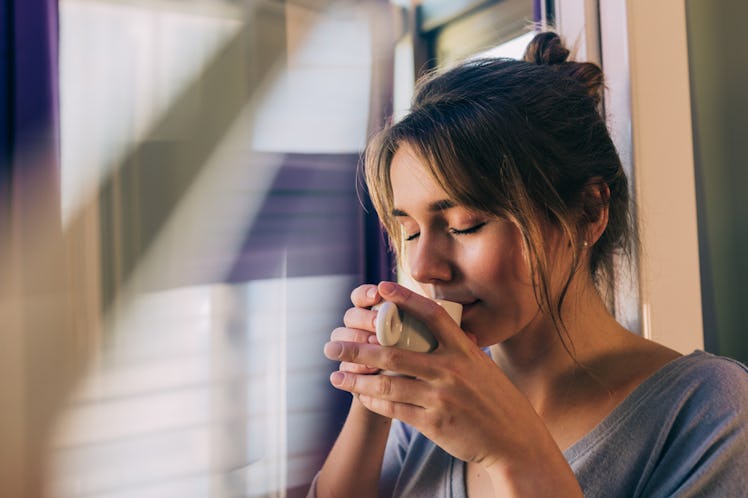
These Are The Best Types Of Tea For Reducing Stress, According To Science
Everyone has their own set of rituals they like to turn to when they're feeling stressed. For you, it might be homemade chicken noodle soup, or it could be watching season after season of Friends until your laptop battery runs out. One especially common habit is drinking tea to reduce stress after a long week of dealing with a series of annoying and anxiety-provoking situations. But does drinking tea actually reduce stress, or is it one of those placebo-effect situations where you simply think it's helping, and that's what makes you feel better to begin with?
Of course, the first thing to take into consideration is that there are tons of different kinds of tea in the world, with a whole host of different herbal ingredients and levels of caffeination, all of which can produce different effects in your body. Seriously, some forms of caffeinated tea might make you feel just as wired as a cup of coffee would.
On the other hand, though, there are plenty of teas out there that are created with natural ingredients that have been shown to relax the mind and decrease overall stress. Drinking a cup of decaffeinated tea before bed is an amazing bedtime habit for this very reason: It can calm you and encourage sleep.
Decaffeinated green tea, in particular, has been scientifically proven to both decrease your stress levels and improve your quality of sleep.
In a 2017 study published in the journal Nutrients, participants were able to fall asleep much more easily when drinking decaffeinated green tea, and they reported feeling much less stressed out over the course of the one-week experiment. Now, the key distinction here for "the anti-stress effect," the researchers noted, was making sure that the green tea was decaffeinated. So keep that in mind the next time you're wondering why you're so on-edge after your third cup of (ahem, caffeinated) coffee.
But green tea isn't the only tea that's been connected to lower stress. In a 2010 study done by researchers from University College London, drinking black tea decreased people's stress levels over a six-week period. What's more, when the participants in the research did come head-to-head with a stressful situation (in the experiment, this included fabricated instances of things like a threat of getting fired, or being accused of shoplifting), their levels of cortisol (aka a hormone that regulates stress) dropped significantly. In other words, drinking black tea not only helped them feel less stressed overall, but it also enabled them to deal with sudden stress more easily than those who didn't drink black tea.
If you're looking for something a bit more flavorful, there are plenty of natural teas that promise the same anti-stress benefits.
If you're a fan of peppermint tea, then I have very good news for you: Menthol (a base element of peppermint) is said to be a natural stress-reliever, and as a result, peppermint tea can help reduce your blood pressure and overall body temperature, thus making you feel more relaxed.
Then, of course, there's always one of the most classic options for tea: chamomile, which has been shown to significantly reduce symptoms of generalized anxiety disorder, according to a 2016 study published in the journal Phytomedicine. What's more, The Cut reports that chamomile tea really is that powerful in terms of reducing stress, and Dr. Chris D’Adamo, an assistant professor at the University of Maryland School of Medicine, told the outlet that this tea's wellness effects really do "extend far beyond just the placebo effect."
Bottom line: You're not just feeling good when you drink tea because you think you should; it's actually affecting the way your body processes and responds to stress.
The next time you're feeling stressed, keep a cup of tea in mind. It won't solve everything, but it certainly won't hurt, either. At the very least, you'll have a hot mug to hold in your hands and something yummy to slurp down.